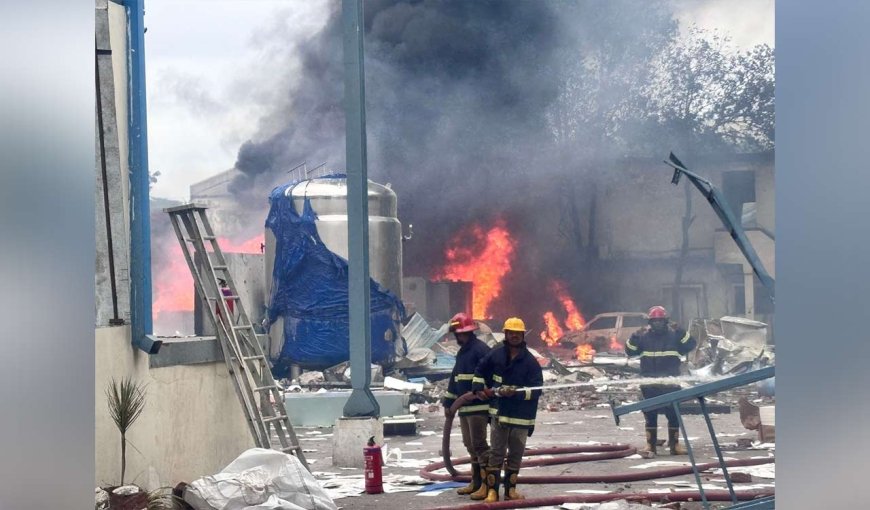Deadly Blast at Telangana Chemical Factory: Safety Lapses Under Scrutiny
A deadly explosion at SB Organics Ltd. in Sangareddy, Telangana, killed 8 and injured 20+. Investigations reveal serious safety lapses in reactor monitoring and regulatory oversight.

A powerful explosion tore through a chemical manufacturing unit in Telangana’s Sangareddy district late Wednesday, killing at least eight workers and leaving over 20 injured, some critically. The incident occurred at SB Organics Ltd., located in Hathnoora Mandal, and has triggered fresh concerns about industrial safety in India's booming but loosely regulated pharmaceutical sector.
The Incident
According to police and factory officials, the blast originated from a jacketed reactor inside the plant's primary processing unit. Preliminary reports suggest the reactor overheated due to a hot oil leak, which caused a rapid chemical reaction and triggered the explosion. Witnesses described a loud blast that shook nearby structures and sent flames and thick black smoke billowing into the sky.
Around 60 employees were on duty at the time. The blast occurred at approximately 5:10 PM, with some employees working within meters of the reactor. Many of the injured suffered severe burns, blunt force trauma, and respiratory issues due to chemical inhalation.
First Responders and Rescue Efforts
Fire and rescue teams reached the site within 30 minutes. Five fire engines worked for nearly two hours to bring the blaze under control. Local police and emergency medics set up a temporary triage zone to stabilize victims before shifting them to hospitals in Sangareddy and Hyderabad, including Yashoda Hospital, Care Hospitals, and NIMS.
Telangana Chief Minister Revanth Reddy issued a statement expressing grief and announced compensation for the families of the deceased. He also ordered a high-level probe into the causes of the explosion.
Survivor Accounts
Workers who managed to escape spoke of negligence in handling the early signs of malfunction. “There was smoke coming from the reactor at least 30 minutes before the explosion. We told our supervisors, but they asked us to keep working. They said it was minor,” said a 29-year-old technician, who is now recovering from minor injuries.
Another injured worker added that the plant's temperature monitoring system had been unreliable for weeks. “We had raised complaints, but no maintenance was done.”
Company Profile and Prior Record
SB Organics Ltd. is a mid-sized manufacturer of bulk drugs and chemical intermediates, primarily supplying clients in India and Southeast Asia. The company employs over 200 people across its two facilities in the region.
Local authorities confirmed that the company had no major accidents reported in the past, but internal audits had flagged concerns about reactor pressure handling, waste disposal, and emergency response training in a 2023 compliance report.
Regulatory Oversight and Negligence
The blast has once again spotlighted Telangana’s fragile industrial safety regime. Despite being home to over 4,000 high-risk chemical and pharma factories, the state has fewer than 25 qualified safety inspectors. Each inspector is tasked with auditing more than 150 facilities annually, making it nearly impossible to ensure compliance in real time.
Experts believe the lack of predictive maintenance, digital monitoring systems, and emergency drills makes such factories vulnerable to disasters. A retired safety officer from the state’s Department of Factories noted, “Many companies still use outdated equipment, including old reactors without modern sensors. Inspections are paper formalities unless a tragedy occurs.”
What’s Next?
Authorities have sealed the unit pending a full investigation. A case has been registered under Sections 304 and 338 of the IPC (culpable homicide and grievous hurt due to negligence). Forensic teams are examining reactor debris and electronic control logs to determine whether equipment failure or human error triggered the blast.
The Telangana government has also formed a special task force to audit similar high-risk factories in Sangareddy, Medak, and neighboring districts within the next 15 days.
Conclusion
This incident serves as yet another grim reminder that India's industrial engine continues to run with compromised safety protocols and patchy enforcement. Until companies are made accountable and safety becomes non-negotiable, the risk to workers' lives will persist.











